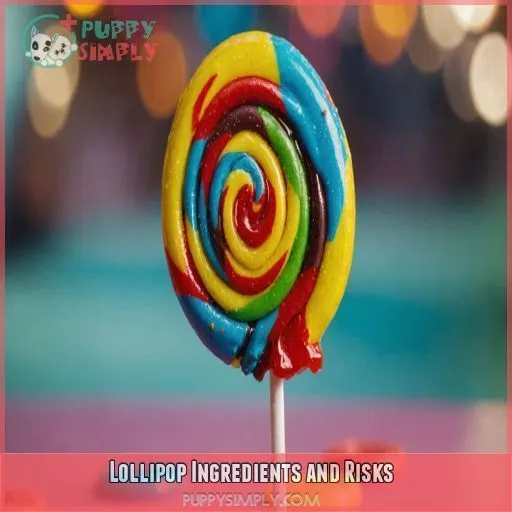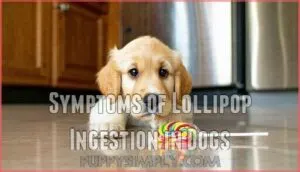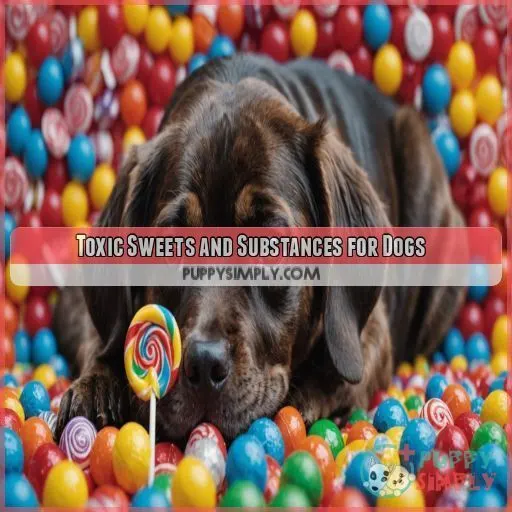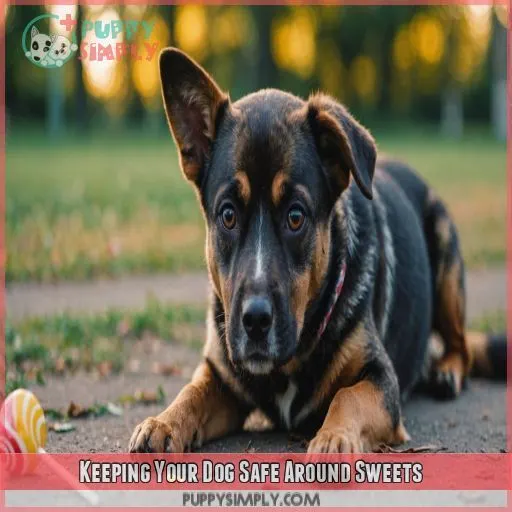This site is supported by our readers. We may earn a commission, at no cost to you, if you purchase through links.
 Can dogs eat suckers? Well, consider it a lick and a miss situation. While your furry friend might find a lollipop irresistible, it’s best to keep them out of paw’s reach.
Can dogs eat suckers? Well, consider it a lick and a miss situation. While your furry friend might find a lollipop irresistible, it’s best to keep them out of paw’s reach.
Sugar in suckers can lead to weight gain and dental issues, while xylitol (often found in sugar-free candies) can be toxic. Plus, those sticks are more of a choking hazard than a fetch toy.
If your four-legged detective snags a sucker, watch out for signs like vomiting or wobbliness. A sweet lick could turn sour fast! Keep reading to discover how to protect your curious canine from candy catastrophes.
Table Of Contents
- Key Takeaways
- Lollipop Ingredients and Risks
- Symptoms of Lollipop Ingestion in Dogs
- When to Seek Veterinary Care
- Preventing Lollipop Ingestion in Dogs
- Toxic Sweets and Substances for Dogs
- Keeping Your Dog Safe Around Sweets
- Frequently Asked Questions (FAQs)
- What happens if your dog eats lollipops?
- What candy is toxic to dogs?
- What happens if your dog eats lollies?
- Can dogs eat Dum Dums?
- Can lollipops affect a dogs behavior?
- How much of a lollipop is dangerous?
- Are sugar-free lollipops safer for dogs?
- What are safe alternatives to lollipops?
- Do dogs show immediate symptoms after eating lollipops?
- Conclusion
Key Takeaways
- Lollipop Temptation: Your dog’s curious nose might lead them to a sugary sucker, but it’s a sweet treat they should avoid. Sugar and artificial sweeteners, such as xylitol, are potential disasters, with xylitol being especially toxic to dogs.
- Choking on Danger: Those candy sticks aren’t fetch toys! Lollipop sticks pose a real choking hazard or could lead to an intestinal blockage before you can say "good boy."
- Symptoms to Watch: If Fluffy’s snagged a sucker, keep an eye out for vomiting, diarrhea, or unsteady walks. Call the vet faster than your pup can wag its tail if symptoms appear.
- Safe Sweets Sense: In your candy-free zone, focus on dog-friendly treats like carrots or apple slices. These safe alternatives will keep your dog’s tail wagging without a trip to the vet.
Lollipop Ingredients and Risks
When your dog eyes your lollipop with that irresistible charm, know that it’s packed with ingredients more suited for a sweet trap than a treat. From sugar and artificial sweeteners to colorful dyes, every swirl and twirl poses hazards they just shouldn’t lick.
Sugar and Artificial Sweeteners
While sugar may satisfy your pup’s sweet tooth, it can lead to weight gain, dental issues, and even pancreatitis. Steer clear of sugary lollipops and opt for healthier, dog-safe treats instead. Your furry friend’s wellbeing is worth more than a quick sugar fix.
Xylitol and Other Toxic Substances
Now, let’s talk about xylitol and other villainous substances lurking in lollipops. Xylitol is like a wolf in sheep’s clothing—dangerous for dogs. Watch out for:
- Xylitol poisoning causing seizures and liver failure
- Toxic ingredients leading to stomach woes
- Gastrointestinal irritation as an unpleasant surprise
Flavors and Colors
After exploring harmful sweeteners, let’s tackle flavors and colors in lollipops. Artificial dyes and ingredients in hard candy may irritate your pup’s tummy like leaving the wrappers on candy corn. Stick to natural dog food to keep their curiosity from barking up the wrong candy aisle!
Choking Hazards and Intestinal Blockage
While flavors and colors might cause an upset stomach, the lollipop stick steals the show in danger. It can be a sneaky choking hazard, leading to an intestinal blockage quicker than you can say "fetch!" Responsible dog owners, stick to dog safe treats and pet food.
Symptoms of Lollipop Ingestion in Dogs
If your dog has indulged in a lollipop, keep a close eye out for concerning symptoms like vomiting, diarrhea, lethargy, and abdominal pain. In severe cases, your pup may even experience seizures or slip into a coma, so don’t hesitate to contact your vet right away.
Vomiting and Diarrhea
When you’re wondering if dogs can eat suckers, or perhaps your pup’s already raided your secret stash, vomiting and diarrhea can follow. Here’s why:
- Causes of Vomiting: Ingredients like sugar can upset tummies.
- Gastroenteritis Overview
- Dehydration Signs
- Home Treatments
Lethargy and Abdominal Pain
If your pup seems sluggish or their tummy’s upset after a lollipop mishap, don’t panic! Lethargy and abdominal pain are common signs they’ve indulged. Keep a close eye and contact your vet right away for guidance on the next steps to get them feeling better.
| Symptom | Cause | Action |
|---|---|---|
| Lethargy | Sugar overload, digestive distress | Monitor closely, provide water |
| Abdominal Pain | Irritated stomach, potential blockage | Seek vet care immediately |
Seizures and Coma
Seizures and coma can sound scary as a haunted house on Halloween! These neurological impacts might occur if your dog nibbles on lollipops. Here are potential seizure causes and coma symptoms:
- Trembling
- Loss of consciousness
- Uncontrolled movements
- Recovery process
Call the vet ASAP!
Monitoring Your Dog’s Health
Should your pup start behaving oddly after munching on that forbidden sucker, it’s imperative to keep a keen eye out. Recognizing concerning symptoms early, like lethargy or wobbliness, feels like a superpower. Remember, seeking veterinary guidance brings peace of mind in monitoring changes in behavior effectively.
When to Seek Veterinary Care
If your dog has gotten into a lollipop, it’s imperative to contact your vet right away. Depending on the type of lollipop and how much your pup has consumed, your vet can provide guidance on the best course of action to keep your furry friend safe and healthy.
Emergency Situations
Spotting a dog with a guilty face and a stick-less sucker, stay alert for symptoms. Act swiftly in emergency situations:
- Poison Control: Keep the number handy.
- Urgent Care: Get to the vet fast.
- Emergency Supplies: Have them ready at home.
Types of Lollipops and Amounts Consumed
Not all lollipops are created equal, especially for dogs! From sugar-free varieties to organic options, the type and amount matter. Mini lollipops might seem harmless, but bulk consumption can be a recipe for disaster.
| Lollipop Type | Risk Level | Action |
|---|---|---|
| Sugar-Free | High | Call the vet |
| Homemade | Moderate | Monitor closely |
| Organic | Varied | Assess symptoms |
Keep a keen eye, and you’ll handle any lollipop escapade like a pro!
Your Dog’s Overall Health
Dogs are like our darling childrenkeeping track of their health is essential. Consider their:
- Exercise routines to burn off energy
- Dental care for pearly whites
- Grooming routines to prevent tangles
- Vaccination schedules to fend off illness
- Dietary plans for a balanced belly
Be a dog-health champion!
Veterinary Guidance and Treatment
So, you’ve noticed something’s off with your pooch. It’s time to channel your inner detective and call your vet. They’ll provide guidance on veterinary costs, emergency protocols, and treatment options, especially if xylitol toxicity is a concern. Regular check-ins help monitor recovery effectively!
Preventing Lollipop Ingestion in Dogs
To keep your dog safe from lollipop misadventures, stash sweets where they can’t reach and keep a watchful eye on their antics. Teaching commands like "leave it" can turn your curious pup into a well-behaved candy detective, preventing any sticky situations.
Storing Sweets Safely
After considering veterinary care, let’s talk candy storage tips. Imagine this: Fidos like a detective, nose twitching, hunting for sweets. Keep lollipops in childproof, pet-safe storagehigh cabinets, secure snack containers. Avoid your four-legged Houdini turning sweet treats into doctor visits! Who knew dogs were such candy bandits?
Supervising Your Dog
After safely storing goodies, active observation is your next line of defense. Distract your pup with outdoor adventures or toys. Pay attention to behavioral cues, as they could be eyeing your sweets! Implement safety routines that resemble a ninja guarding treasure, ensuring your curious canine stays lollipop-free.
Teaching Basic Commands
Think of basic commands as life jackets for dogs. They’re a must! Use dog training tips like command consistency and positive reinforcement. Treats as rewards work wonders, so bring on the Beggin’ Strips. With training patience, your clever pooch will learn "leave it" like a champ!
Being Mindful of Your Dog’s Curiosity
You’ve mastered teaching commands—good job! Now, dog-proofing your home means understanding curiosity triggers. Dogs are like detectives sniffing out hidden dangers. Safeguard your dog by focusing on:
- Limiting access to sweet spots.
- Identifying favorite chew zones.
- Utilizing training tips consistently.
Toxic Sweets and Substances for Dogs
In addition to lollipops, there are other sweets like raisins, grapes, caffeine, and chocolate that can poison your pup faster than they can gobble them up. You need to guard your snack stash like it’s the crown jewels when your furry friend is around!
Raisins and Grapes
Surprisingly, a batch of raisins or grapes can spell trouble for your dog. These little fruits might look innocent, but they’re toxic villains in disguise that wreak havoc on dog health. Instead, offer safe alternatives like apples or carrots, and keep reducing raisin & grape poisoning on your radar.
Caffeine and Chocolate
Your morning cup of joe and chocolate bar might perk you up, but both can spell trouble for Fido. Caffeine toxicity and chocolate dangers lurk here—causing anything from jitters to serious health issues. Keep these treats out of paw’s reach. Opt for safe treat alternatives instead!
Other Hazardous Substances
Just like caffeine and chocolate, household cleaners and some medications can spell trouble for your pup. Even pet food, if it’s not meant for dogs, can cause issues. Beware of plant toxicity and detergents lurking around; they’re like surprise guests you never invited.
Keeping Your Home Safe
Childproof your home to keep your curious pup safe. Stash sweets in secure, locked cabinets. Secure trash cans to prevent scavenging. Hide treats in pet-friendly storage. With a few simple steps, you can create a home that’s both sweet and safe for your furry friend.
Keeping Your Dog Safe Around Sweets
It’s tempting to let your dog join in on your sweet treats, but giving them suckers can lead to a sticky situation! Keep your pup safe by offering dog-friendly alternatives and educating family and friends about the risks of sweets.
Safe Alternatives to Sweets
While lollipops are risky, you’re not doomed to a home minus treats! Try organic fruit treats or peanut butter snacks, which dogs typically love. Sweet potato chews are a hit, too. Even dog-safe yogurt or cinnamon biscuits can keep your pup’s tail wagging without worry!
Healthy Treats and Snacks
After skipping the sweets, you’re likely wondering what to give Fido instead. Homemade dog treats or dental chews are fantastic! Look for healthy snack recipes or safe human foods like carrots. Reliable dog food brands offer nutritious options too. Remember, a happy pup is a healthy pup!
Educating Family and Friends
Educating your family and friends about the dangers of sweets for your pup is key. Share these tips:
- Explain why certain treats are off-limits
- Suggest safe, healthy snack alternatives
- Enlist their help in keeping your canine companion safe.
Creating a Safe Environment
While you’re teaching others about dog safety, consider setting up sweet-free zones at home. Dog-proof storage and secure cabinets can keep treats out of paw’s reach. Always supervise your curious canine, like watching over a toddler with sticky fingers. Prevention beats unexpected vet trips!
Frequently Asked Questions (FAQs)
What happens if your dog eats lollipops?
If your dog eats lollipops, watch for tummy troubles, choking hazards, or toxic reactions from ingredients like xylitol. It’s best to consult your vet pronto for tail-wagging peace of mind and to avoid a sticky situation.
What candy is toxic to dogs?
Ever watch your dog eye candy? Here’s the scoop: chocolate, xylitol (from sugar-free treats!), and raisins are doggy dangers. Chocolate’s caffeine and theobromine can lead to a wild heart race. Keep treats human-only, and stay safe!
What happens if your dog eats lollies?
If your dog eats lollies, they might experience tummy troubles like vomiting or diarrhea. If the lollies contain xylitol, it can lead to more serious issues. Watch for symptoms and call your vet for advice.
Can dogs eat Dum Dums?
Imagine a dog, like a kid in a candy store, gobbling Dum Dums. While delightful for humans, these sugary lollipops can harm your pup. Sugar, possible xylitol, and the stick are risks. Avoid them for tails’ sake!
Can lollipops affect a dogs behavior?
Lollipops can mess with your dog’s mood, like a sugar high gone wrong! Too much sugar or harmful ingredients like xylitol might lead to hyperactivity or discomfort. Keep an eye out and call the vet if needed (Source).
How much of a lollipop is dangerous?
Curiosity did kill the cat, or in this case, harm the dog. Even a small piece of a lollipop can be dangerous, especially if it contains xylitol. Always keep these sweets out of your pup’s reach!
Are sugar-free lollipops safer for dogs?
No, sugar-free lollipops aren’t safer for dogs. In fact, they can be even more dangerous due to the artificial sweetener xylitol, which is highly toxic to canines and can cause life-threatening drops in blood sugar. (Source)
What are safe alternatives to lollipops?
Did you know 65% of dogs prefer treats they can actually eat? Try carrots, apples (minus the seeds), or homemade pumpkin dog biscuits. They’re tail-waggingly good and won’t land you in the vet’s office!
Do dogs show immediate symptoms after eating lollipops?
Dogs mightn’t show immediate symptoms after eating lollipops, but watch for vomiting, diarrhea, or lethargy. If your pooch seems off, it’s worth a quick chat with the vet to make sure everything’s alright (Source).
Conclusion
Imagine this: A candy-coated minefield just waiting for your dog to step paw-first into a sugary disaster!
Can dogs eat suckers safely? Absolutely not.
With risks like toxic xylitol, choking hazards, and tummy troubles, it’s better to keep sweets out of reach.
Instead, offer safe treats and maintain a sucker-free zone.
Keep their health as sweet as possible by staying vigilant, and remember, a curious nose shouldn’t end up in candy trouble!












